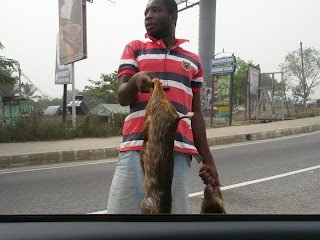
My theme for the last few days has been unusual buildings. The XGI Tower was built by a Nigerian company for an investment Group. It stands out. Concave sides, reflective windows, a rotating restaurant on top make it a landmark of innovative techniques in a country that is still trying to make driving rules uniform.

I love this apartment building. If you look very closely, you can see a person standing against the railing taking in the view. I have a goal of going to the top of this building sometime during our stay.

The colors are just fun, and it is the only orange building in the area. They win. And, no one else has thought of putting a garden on top.

Moving down in the rankings a bit...it the Legon Police Station. It looks sturdy and official enough. It resides on a fairly main road, so easy to find. Very few places waste money on landscape features, and the Police Station need not impress anyone: you either need them or you don't. I just find it interesting as we are driving along, to spot a police station where there aren't any other city businesses.

The entry way announces: The Institute of Professional Studies. Several of our PEF students attend here, but even it has a dirt driveway. It is a mixture of modern and practical architecture. It would seem that Ghana would be lacking in higher education, but actually there are many universities in Accra. I don't know how they become certified, licensed, or accredited, and yet, many have outstanding reputations.

Still looking at the same university, but this stairway is attached to the student housing.

This place was a delight to find. The outside is a patio-style African restaurant, but inside are 3 main (yet short) aisles of Costco products! Yessss. There are a few Kirkland items (really wish they carried Kirkland chocolate drink), Campbells soups, chocolate chips,pickles, cereals, jams, etc. It is like seeing an old friend when you see a product made in America.

We've not yet found the restaurant that goes with this billboard, but it is entertaining to think of a Red Lobster. Their menu undoubtedly is NOT the same, but someone has capitalized on the name.

There are a few department-type stores here, but the prices are horrible. Most people just shop at the street vendors. Love the bags.

For the longest time I couldn't find where women bought make-up, but there are a million hair boutiques with hair products. I also liked this "California" sign out front.

Just about everything is for sale at a street vendor's. Headboards and foam "toppers" seem to be a hot property to sell as well.

A nearby school. I took this on a Sunday, and I wish I could get a picture with all the school children in attendance. Depending on the school, the students dress in the uniform colors, in various styles, and they are so colorful. The range of ages is much like home; we see elementary ages up to high school, all dressed in the same colors. Schools all have the very smallish windows, dirt surroundings, and open-air classrooms. I really hope, at some point, I can volunteer to help out in a classroom.
And, this is Africa.

















